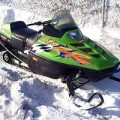Keith: The next story, "Death of a Snow Machine"-now, this story is simply a story about an old man, a trapper, I would presume that he's Inuit-and he's getting ready for another winter of trapping, and trying to get the old snowmobile going, that he bought in 1968 and no longer works all that well. Essentially, the story-the old man trying to get the snowmobile going, and the eventual death of that snow machine. Now, this story is set in the "irony and symbol" portion of this anthology. The irony I personally don't think is all that strong in this story, although there is irony in it. Symbolism, without a doubt, is the significant element of this short story. I'll ask Jill and David this question: What is the main symbol in this story, and what does it symbolize? David: The penny. [laughter] I don't know. Over to Jill.
Jill: The snow machine is the main symbol in this story. It symbolizes the modern-day dog [laughter], the use of machinery and equipment to replace what animals used to do, and how it's not as effective or efficient in certain ways. David: It's a comment on his lifestyle and his own civilization, the machine being something that is the end to which all simplistic, rural civilizations end up moving toward. It's the encroachment of civilization into his live. Keith: Actually, the word "civilization," I'm glad you brought it up. There you go. He sort of resents modern-day conveniences, or dependence on modern-day conveniences, although it's never expressly written that there's any anger, resentment. But, the snow machine definitely represents or symbolizes his anger toward modernization. It also-he refers to his son twice in this story, if I'm not mistaken, how he's lucky he got away and escaped to the modern world. Actually, I'll read the quote here. "He sat and surveyed the cabin, gazing at the mementos from the past. His eyes rested on a picture of his son, who had left the reserve a long time ago to rejoin civilization. He only returned to visit for two weeks each summer." So, you know, if you spent your life raising a child and all of a sudden he runs off to the big city and only comes back twice a week, there's probably some resentment. David: Why, Keith, does he say "rejoin civilization?" Why would he consider the outside-is he saying his son left his world to rejoin civilization? And why would he consider the outside world "civilization"? Why would he consider his own world an uncivilized world?
Keith: The only way I can see it is that it's like someone using self-deprecating humor to take away from their situation, or take away from a complicated or uncomfortable situation. That's the only reason I can think of to answer that question. David: It's bizarre that he's living in a place that is so fundamental and the machine itself does not survive. It can't survive, it's dying, it's not surviving. You know, that "patta, patta" is like a heartbeat trying to work, and I'm thinking of his life and his way of living is not surviving. But at the end of the story, I'm surprised to see that there's sort of a resolution going back to the way he lived, and the machine doesn't survive, he survives. It's a more simple way of surviving, and that he would think of that as not civilization-maybe he is using irony here and referring to it as "their civilization," and he's aware of the fact that "I could be living in a different world that is more civilized, but here I am in my own world, where I came from, where all my people came from for thousands of years, and this is sort of outside of the civilized world." It's a strange notion.

